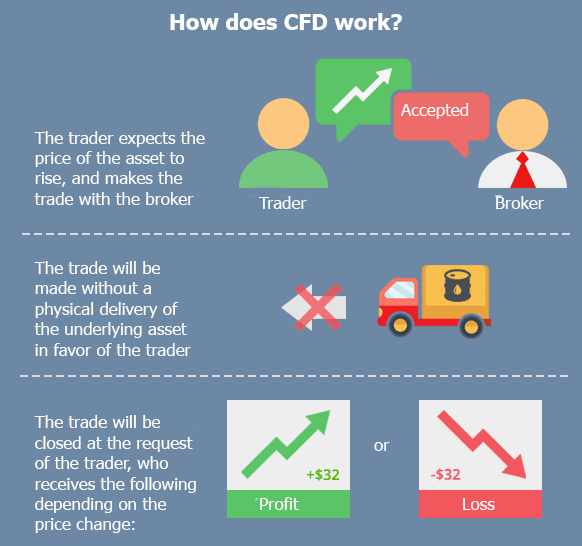Investment Manager
- Available 24/7
- ***
- Invest with us
Contract for Differences
What Is a Contract for Differences (CFD)?
A contract for differences (CFD) is an arrangement made in financial derivatives trading where the differences in the settlement between the open and closing trade prices are cash-settled. There is no delivery of physical goods or securities with CFDs.
Contracts for differences is an advanced trading strategy that is used by our experienced traders.
Understanding Contract for Differences
CFDs allow traders to trade in the price movement of securities and derivatives. Derivatives are financial investments that are derived from an underlying asset. Essentially, CFDs are used by investors to make price bets as to whether the price of the underlying asset or security will rise or fall.
CFD traders may bet on the price moving up or downward. Traders who expect an upward movement in price will buy the CFD, while those who see the opposite downward movement will sell an opening position.
Should the buyer of a CFD see the asset's price rise, they will offer their holding for sale. The net difference between the purchase price and the sale price are netted together. The net difference representing the gain or loss from the trades is settled through the investor's brokerage account.
Conversely, if a trader believes a security's price will decline, an opening sell position can be placed. To close the position they must purchase an offsetting trade. Again, the net difference of the gain or loss is cash-settled through their account.
Transacting in CFDs
Contracts for differences can be used to trade many assets and securities including exchange-traded funds (ETFs). Traders will also use these products to speculate on the price moves in commodity futures contracts such as those for crude oil and corn. Futures contracts are standardized agreements or contracts with obligations to buy or sell a particular asset at a preset price with a future expiration date.
Although CFDs allow investors to trade the price movements of futures, they are not futures contracts by themselves. CFDs do not have expiration dates containing preset prices but trade like other securities with buy and sell prices.
CFDs trade over-the-counter (OTC) through a network of brokers that organize the market demand and supply for CFDs and make prices accordingly. In other words, CFDs are not traded on major exchanges such as the New York Stock Exchange (NYSE). The CFD is a tradable contract between a client and the broker, who are exchanging the difference in the initial price of the trade and its value when the trade is unwound or reversed.
Advantages of a CFD
CFDs provide traders with all of the benefits and risks of owning a security without actually owning it or having to take any physical delivery of the asset.
 CFDs are traded on margin meaning the broker allows investors to borrow money to increase leverage or the size of the position to amply gains. Brokers will require traders to maintain specific account balances before they allow this type of transaction.
CFDs are traded on margin meaning the broker allows investors to borrow money to increase leverage or the size of the position to amply gains. Brokers will require traders to maintain specific account balances before they allow this type of transaction.
Trading on margin CFDs typically provides higher leverage than traditional trading. Standard leverage in the CFD market can be as low as a 2% margin requirement and as high as a 20% margin. Lower margin requirements mean less capital outlay and greater potential returns for the trader.
Typically, fewer rules and regulations surround the CFD market as compared to standard exchanges. As a result, CFDs can have lower capital requirements or cash required in a brokerage account. Often, traders can open an account for as little as $1,000 with a broker. Also, since CFDs mirror corporate actions taking place, a CFD owner can receive cash dividends increasing the trader’s return on investment. Most CFD brokers offer products in all major markets worldwide. Traders have easy access to any market that is open from the broker’s platform.
CFDs allow investors to easily take a long or short position or a buy and sell position. The CFD market typically does not have short-selling rules. An instrument may be shorted at any time. Since there is no ownership of the underlying asset, there is no borrowing or shorting cost. Also, few or no fees are charged for trading a CFD. Brokers make money from the trader paying the spread meaning the trader pays the ask price when buying, and takes the bid price when selling or shorting. The brokers take a piece or spread on each bid and ask price that they quote.

